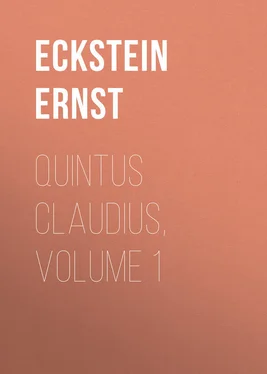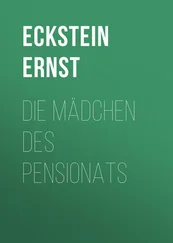Ernst Eckstein - Quintus Claudius, Volume 1
Здесь есть возможность читать онлайн «Ernst Eckstein - Quintus Claudius, Volume 1» — ознакомительный отрывок электронной книги совершенно бесплатно, а после прочтения отрывка купить полную версию. В некоторых случаях можно слушать аудио, скачать через торрент в формате fb2 и присутствует краткое содержание. Жанр: foreign_antique, foreign_prose, на английском языке. Описание произведения, (предисловие) а так же отзывы посетителей доступны на портале библиотеки ЛибКат.
- Название:Quintus Claudius, Volume 1
- Автор:
- Жанр:
- Год:неизвестен
- ISBN:нет данных
- Рейтинг книги:4 / 5. Голосов: 1
-
Избранное:Добавить в избранное
- Отзывы:
-
Ваша оценка:
- 80
- 1
- 2
- 3
- 4
- 5
Quintus Claudius, Volume 1: краткое содержание, описание и аннотация
Предлагаем к чтению аннотацию, описание, краткое содержание или предисловие (зависит от того, что написал сам автор книги «Quintus Claudius, Volume 1»). Если вы не нашли необходимую информацию о книге — напишите в комментариях, мы постараемся отыскать её.
Quintus Claudius, Volume 1 — читать онлайн ознакомительный отрывок
Ниже представлен текст книги, разбитый по страницам. Система сохранения места последней прочитанной страницы, позволяет с удобством читать онлайн бесплатно книгу «Quintus Claudius, Volume 1», без необходимости каждый раз заново искать на чём Вы остановились. Поставьте закладку, и сможете в любой момент перейти на страницу, на которой закончили чтение.
Интервал:
Закладка:
“Well?” asked Titus Claudius, as the narrator paused.
“To be sure – the chief point. Well, it was known that Caesar would himself grant the winner some personal favor, and every one gazed at the imperial tribune in the greatest excitement. Caesar ordered the herald to command silence. ‘Scorpus,’ said he, when the uproar was lulled, ‘you have covered yourself with glory. Ask a favor of me,’ and Scorpus bowed his head and demanded in a firm voice, that Domitian should be reconciled to his wife.”
“Audacious!” cried Titus Claudius wrathfully.
“There is better still to come. Hardly had the charioteer spoken, when a thousand voices shouted from every bench: ‘Dost thou hear, oh Caesar? Leave thy intrigue with Julia! 148 148 Julia. The daughter of the Emperor Titus, with whom Domitian for a long time had unlawful relations. Dio Cass. LXVII, 3. Suet Dom. 22.
We want Domitia!’ There was quite a tumult, 149 149 A tumult. Many things are related about such tumults. They were partly impromptu, partly carefully prepared. A striking instance of the latter style is told by Dio Cassius (LXXII, 13) where a cunningly-planned circus-riot causes the fall of the hated lord high-chamberlain Cleander. This omnipotent favorite of the Emperor Commodus had enraged the people by a series of the boldest frauds, during a period of great scarcity. Just as the horses were starting for the seventh race a throng of boys, led by a tall, formidable looking woman, rushed into the arena. The children loaded Cleander with the fiercest curses, the people joined them, all rose and rushed furiously towards the emperor’s Quintilian villa. Commodus, a very cowardly man, was so terrified, that after a short struggle he commanded Cleander and his little son to be slain. The mob dragged the corpse of the chamberlain about in triumph, mutilated it, and stuck the head on a pole as a sign of victory.
a scandalous scene that defies description.”
“But what do the people mean? What has so suddenly brought them to make this demand?”
“Oh!” said Clodianus, “I see through the farce. The whole thing is merely a trick on the part of Stephanus, Domitia’s steward. That sly fox wants to regain for his mistress her lost influence. Of course he bribed Scorpus, and the gods alone know how many hundred thousand sesterces the game must have cost him. The spectators’ seats were filled on all sides with bribed wretches, and even among the better classes I saw some who looked to me suspicious.”
“This is bad news,” interrupted the high-priest. “And what answer did Domitian give the people?”
“I am almost afraid to tell you of his decision.”
“His decision could not be doubtful, I should suppose. By giving Scorpus leave to ask what he would, he pledged himself to grant his prayer. But how did he punish the howling mob that stormed around him? I too regret our sovereign’s connection with his niece, but what gives the populace the right to interfere in such matters?”
“You know,” replied the other, “how tenderly these theatre and circus demonstrations have always been dealt with. Domitian, too, thought it prudent to smother his just anger and to show clemency. When the herald had once more restored order, Caesar said in a loud voice: ‘Granted,’ and left his seat. But he was deeply vexed, noble Claudius.”
“Well and then?” asked the Flamen in anxious suspense.
“Well, the matter is so far carried out, that in the secretary’s 150 150 Secretary. The modern equivalent for the office of “ ab epistulis ,” held under Domitian by the freedman Abascantus. (Stat. Silv. V, 1.) At a later period – under Hadrian and afterwards – such offices were held only by men of knightly rank.
room to-day an imperial decree was drawn up, calling upon Domitia 151 151 Calling upon Domitia. We here follow a passage (somewhat doubtful, it is true) of Dio Cassius (LXVII, 3) which states that the emperor “ at the entreaties of the people ,” became reconciled to his wife. Suetonius ( Dom. 3) says, he only alleged such a desire on the part of the people, but really received the empress again “because the separation from her became unendurable.” For special reasons our story fixes the time of this reconciliation in the year 95, while it actually occurred some time earlier.
to return to her rooms on the Palatine, and granting her pardon for all past offences.”
“And Julia?”
“By Hercules!” laughed Clodianus. "With regard to Julia, Caesar made no promises." 152 152 With regard to Julia, Caesar made no promises. See Dio Cass. LXVII 3. He became reconciled, "but without giving up Julia.”
“Then I greatly fear, that this reconciliation will only prove the germ of farther complications.”
“Very possibly. It has been the source of annoyance enough to me personally. Caesar is in the worst of humors. Do what you can to soothe him, noble Claudius. We all suffer under it…”
“I will do all I can,” said the priest with a sigh. Clodianus noisily pushed back his chair. “Domitian is waiting for me,” he said as he jumped up. “Farewell, my illustrious friend. What times we live in now! How different things were only three or four years ago!”
Claudius escorted him to the door with cool formality. The slaves and freedmen now came back again into the room, and ranged themselves silently in the background, and the “ nomenclator ,” the “namer,” whose duty it was to introduce unknown visitors, came at once to Claudius and said hesitatingly:
“My lord, your son Quintus is waiting in the atrium and craves to be admitted.”
A shade of vexation clouded the high-priest’s brow.
“My son must wait,” he said decisively; “Quintus knows full well, that these morning hours belong neither to myself nor to my family.”
And Quintus, the proud, spoilt and wilful Quintus, was forced to have patience. The Flamen went on calmly receiving his numerous friends, clients and petitioners, who retired from his presence cheerful or hanging their heads, according as they had met with a favorable or an unfavorable reception. Not till the last had vanished was his son admitted to see him.
Quintus had meanwhile conquered his annoyance at the delay he had been compelled to brook, and offered his father his hand with an affectionate gesture; but Titus Claudius took no notice of his son’s advances.
“You are unusually early,” he observed in icy tones, “or perhaps you are but just returning from some cheerful entertainment – so-called.”
“That is the case,” replied Quintus coolly. “I have been at the house of Lucius Norbanus, the prefect of the body-guard. The noble Aurelius was also there,” he added with an ironical smile. “Our excellent friend Aurelius.”
“Do you think to excuse yourself by casting reflections on another? If Aurelius shares your dissipation once or twice a month, I have no objections to raise – I have no wish to deny the right of youth to its pleasures. But you, my son, have made a rule of what ought to be the exception. Since your return from Baiae, you have led a life which is a disgrace alike to yourself and to me.”
Quintus looked at the floor. His respect and his defiant temper were evidently fighting a hard battle.
“You paint it too black, father,” he said at last, in a trembling voice. “I enjoy my life – perhaps too wildly; but I do nothing that can disgrace you or myself. Your words are too hard, father.”
“Well then, I will allow that much; but you, on your part, must allow that the son of the high-priest is to be measured by another standard than the other youths of your own rank.”
“It might be so, if I lived under the same roof with you. But since I am independent and master of my own fortune…”
Читать дальшеИнтервал:
Закладка:
Похожие книги на «Quintus Claudius, Volume 1»
Представляем Вашему вниманию похожие книги на «Quintus Claudius, Volume 1» списком для выбора. Мы отобрали схожую по названию и смыслу литературу в надежде предоставить читателям больше вариантов отыскать новые, интересные, ещё непрочитанные произведения.
Обсуждение, отзывы о книге «Quintus Claudius, Volume 1» и просто собственные мнения читателей. Оставьте ваши комментарии, напишите, что Вы думаете о произведении, его смысле или главных героях. Укажите что конкретно понравилось, а что нет, и почему Вы так считаете.












